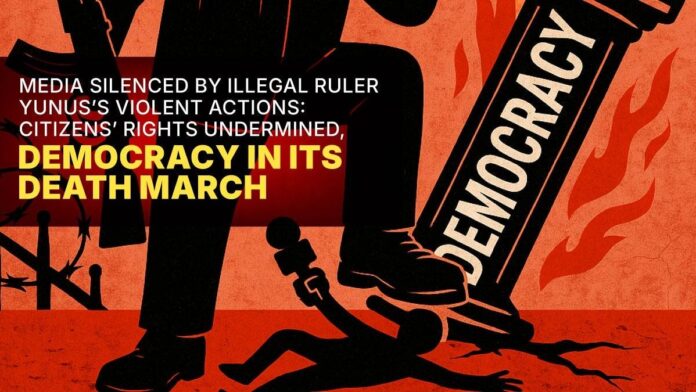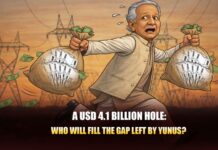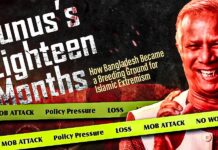
July 2024 will remain a dark chapter in Bangladesh’s history. The group known as the “July Warriors” did not merely overthrow a democratic government; they pushed the entire nation’s democratic progress toward death. After this usurpation, the state machinery transformed from a servant of the people into a master of repression.
In today’s Bangladesh, telling the truth has become a crime. Newspapers, television channels, and online platforms are facing relentless crackdowns. The international organization Reporters Without Borders (RSF) ranked Bangladesh near the bottom in its 2025 index for press freedom. A report by Article 19 stated that in just six months—July to December 2024—340 journalists were attacked, harassed, or arrested. This is not just censorship, but a calculated strategy to wipe out dissent.
Crackdown on the Media
The media was the first victim of the illegitimate rule. The online edition of Prothom Alo was blocked for days, the printing press of Samakal was shut down, and licenses of Channel 24 and Somoy TV were put at risk—these are just a few examples. Journalists’ press accreditations were revoked, barring them from Parliament and the Secretariat.
The Right to Information Act has become meaningless. When journalists request official documents, they are rejected under the pretext of “national security.” Yet, the people’s right to know is the foundation of democracy. When the media is shackled, state accountability collapses.
Bangladesh in a State of Silence
Today’s Bangladesh is effectively a state of silence. Teachers, journalists, writers, or ordinary citizens—anyone expressing dissent is arrested under the ICT Act or on charges of sedition. According to the human rights group Odhikar, between August 2024 and March 2025, nearly 2,000 people were arrested for social media posts.
University teachers cannot express opinions freely in their research or classrooms. A Dhaka University professor was suspended immediately after saying “the Yunus government is illegitimate.” Just as journalist Shafiqul Islam Kajol was forcibly disappeared in 2020, the same climate of fear has returned to society.
Impact on the People
Democracy is not only about elections; it is also about freedom of expression, the right to information, and government accountability. But as these collapse, public trust is eroding. A report by the international survey organization Gallup shows that at the beginning of 2025, only 21% of Bangladeshi citizens expressed trust in the government, the lowest in a decade.
This increases the risk of social unrest. In villages and cities alike, people whisper, “The state is no longer ours; the state now intimidates us.”
Lessons from History
One of the key causes of Bangladesh’s Liberation War was the suppression of dissent. In 1971, the Pakistani regime first targeted journalists and intellectuals. Today’s Bangladesh is treading the same path.
During the Liberation War, journalists of Weekly Joy Bangla and Sangbad secretly revealed the truth. History bears witness—truth can never be silenced. Today’s repression too will one day give birth to a people’s resistance movement.
Bangladesh now stands at a crossroads. Silencing journalists is not just a problem for one profession; it is a crisis for the entire nation. Journalism is the eyes and ears of democracy. If those eyes go blind, if those ears go deaf, the state will be lost in darkness.
The media is silenced, citizens’ rights are undermined, and thus Bangladesh’s democracy is on a death march. The question is: will the nation accept this darkness, or will it rise to build a new movement for truth and light? History has placed that responsibility before us.




